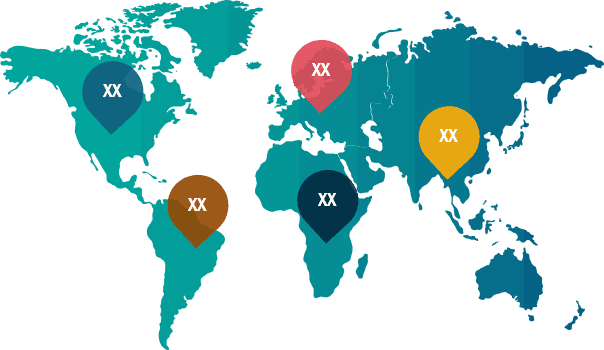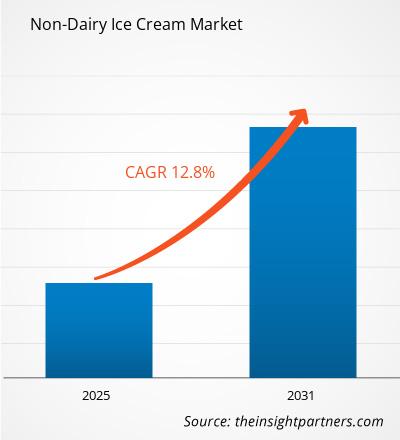非乳制冰淇淋市场规模预计将从 2023 年的 19 亿美元增至 2031 年的 49 亿美元。预计 2023 年至 2031 年市场复合年增长率为 12.8%。通过营销农场故事来吸引顾客以及增加主要参与者的口味创新可能仍然是市场的主要趋势。
非乳制冰淇淋市场分析
非乳制冰淇淋市场的增长主要归因于可支配收入的增加、城市化的快速发展和生活水平的提高。此外,植物性产品的日益普及和年轻人健康意识的高涨预计将推动该地区的市场增长。该地区的主要参与者正在采取并购、合作、伙伴关系和产品发布等战略举措,以满足该地区非乳制冰淇淋市场不断增长的需求。
非乳制冰淇淋市场概述
近年来,在消费者对植物性和无乳制品替代品的需求不断增长的推动下,非乳制品冰淇淋市场一直在经历显着增长。健康意识、乳糖不耐症、素食主义和环境问题等因素推动了这一增长。市场上的主要参与者提供各种由杏仁奶、豆奶和腰果奶等成分制成的非乳制冰淇淋选择,以满足不同的饮食和口味偏好。口味和质地的创新以及分销渠道的扩大有助于市场的增长。然而,与乳制品冰淇淋相比,非乳制品冰淇淋的高价格可能会阻碍市场的增长。
定制研究以满足您的要求
我们可以优化和定制我们的标准产品无法满足的分析和范围。这种灵活性将帮助您获得业务规划和决策所需的准确信息。
非乳制冰淇淋市场:战略洞察

年均复合增长率(2023 - 2031)12.8%- 2023 年市场规模
19 亿美元 - 2031 年市场规模
49 亿美元

市场动态
- XXXXXX
- XXXXXX
- XXXXXX
- XXXXXX
- XXXXXX
- XXXXXX
- XXXXXX
- XXXXXX
- XXXXXX
关键人物;主力;重要一员
- 联合利华
- 达能公司
- 通用磨坊公司
- 雀巢公司
- 裘德的;欧特利公司
- Tofutti 品牌公司
- 极乐无限有限责任公司
- 布鲁克林乳品厂
- 滩武
区域概况

- 北美
- 欧洲
- 亚太
- 南美洲和中美洲
- 中东和非洲
市场细分
 味道
味道- 香草
- 巧克力
- 水果
 来源
来源- 椰奶
- 杏仁奶
- 豆浆
 分销渠道
分销渠道- 超级市场和大卖场
- 专卖店
- 网上零售
- 示例 PDF 通过定性和定量分析展示了内容结构和信息的性质。
非乳制冰淇淋市场驱动因素和机遇
乳糖不耐症发病率增加有利于市场
成人和儿童乳糖不耐症发病率的增加预计将推动对非乳制冰淇淋的需求。根据国家糖尿病、消化和肾脏疾病研究所的数据,世界上大约 68% 的人口患有乳糖吸收不良。此外,主要制造商对非乳制品冰淇淋和不同口味的需求正在增加。因此,主要区域参与者都致力于新产品的发布。例如,2021 年 9 月,北约宣布推出五种口味的纯素冰淇淋:黑巧克力、摩卡杏仁、开心果、咸焦糖、芒果和覆盆子。
越来越多地采用植物性产品
过去几年,“纯素一月”运动的注册人数急剧增加。因此,由于素食主义的蓬勃发展,冰淇淋等冷冻甜点的制造商正在推出植物性产品。例如,2021 年 5 月,纽约冰淇淋店 Whipped Urban Dessert Lab 推出了“自由之味”纯素冰淇淋。同样,2022年,联合利华旗下品牌Ben & Jerry's推出了两款植物冰淇淋——“巧克力牛奶和饼干”和“土蛋糕”。纯素食人口基数的激增正在促进非乳制品冰淇淋市场的增长。
非乳制冰淇淋市场报告细分分析
有助于非乳制冰淇淋市场分析的关键部分是口味、来源和分销渠道。
- 根据口味,非乳制冰淇淋市场分为香草冰淇淋、巧克力冰淇淋、水果冰淇淋等。 2023 年,香草细分市场将占据更大的市场份额。
- 按来源划分,市场分为椰奶、杏仁奶、豆奶等。
- 从分销渠道来看,市场分为超市及大卖场、专卖店、网上零售等。 2023 年,超市和大卖场细分市场将占据重要市场份额。
按地域划分的非乳制冰淇淋市场份额分析
非乳制冰淇淋市场报告的地理范围主要分为五个地区:北美、亚太地区、欧洲、中东和非洲以及南美洲和中美洲。
北美市场占据主导地位。北美的许多国内外企业,如联合利华、达能、通用磨坊公司、雀巢公司和布鲁克林乳品厂,都涉足非乳制品冰淇淋市场。这些参与者正在采取各种战略举措,例如产品发布、合并、收购和合作,以满足不断增长的消费者需求。例如,京东的 Vegan 一直在开发和销售含有鲜切水果和坚果片的植物基、非转基因和无乳糖冰淇淋口味。因此,在冰淇淋中加入新鲜水果片、糖果、蛋糕颗粒和坚果是市场上快速增长的优质趋势,这推动了非乳制冰淇淋市场的增长。
非乳制冰淇淋市场报告范围
| 报告属性 | 细节 |
|---|---|
| 2023年市场规模 | 19亿美元 |
| 2031 年市场规模 | 49亿美元 |
| 全球复合年增长率(2023 - 2031) | 12.8% |
| 历史数据 | 2021-2022 |
| 预测期 | 2023-2031 |
| 涵盖的细分市场 | 按口味
|
| 覆盖地区和国家 | 北美
|
| 市场领导者和主要公司简介 |
|
- 示例 PDF 通过定性和定量分析展示了内容结构和信息的性质。
非乳制冰淇淋市场新闻和最新动态
非乳制冰淇淋市场是通过收集初级和二级研究后的定性和定量数据来评估的,其中包括重要的公司出版物、协会数据和数据库。以下列出了非乳制冰淇淋市场的一些发展:
- Ben & Jerry's 为其非乳制冰淇淋推出了一种新的燕麦基料。新的非乳制冰淇淋基质将于 2024 年春季在冰淇淋桶和冰淇淋店推出。(来源:公司网站,2024 年 2 月)
非乳制冰淇淋市场报告范围和成果
《非乳制冰淇淋市场规模和预测(2021-2031)》报告对涵盖以下领域的市场进行了详细分析:
- 非乳制冰淇淋市场规模以及全球、区域和国家层面涵盖的所有关键细分市场的预测
- 非乳制冰淇淋市场趋势以及市场动态,例如驱动因素、限制因素和关键机遇
- 详细的 PEST/波特五力分析和 SWOT 分析
- 非乳制冰淇淋市场分析,涵盖主要市场趋势、全球和、主要参与者、法规和最新市场发展
- 行业格局和竞争分析,包括市场集中度、热图分析、知名参与者以及非乳制冰淇淋市场的最新发展
- 详细的公司简介
- 历史分析(2 年)、基准年、预测(7 年)及复合年增长率
- PEST 和 SWOT 分析
- 市场规模价值/数量 - 全球、区域、国家
- 行业和竞争格局
- Excel 数据集



Report Coverage
Revenue forecast, Company Analysis, Industry landscape, Growth factors, and Trends

Segment Covered
This text is related
to segments covered.

Regional Scope
North America, Europe, Asia Pacific, Middle East & Africa, South & Central America

Country Scope
This text is related
to country scope.
常见问题
The report can be delivered in PDF/PPT format; we can also share excel dataset based on the request.
Some of the customization options available based on the request are additional 3–5 company profiles and country-specific analysis of 3–5 countries of your choice. Customizations are to be requested/discussed before making final order confirmation, as our team would review the same and check the feasibility.
The global non-dairy ice cream market is estimated to register a CAGR of 12.8% during the forecast period 2023–2031.
Unilever; Danone S.A.; General Mills Inc; Nestlé S.A.; JUDE'S; OATLY, INC; Tofutti Brands, Inc; Bliss Unlimited, LLC; The Brooklyn Creamery, and NADAMOO are among the prominent players operating in the global non-dairy ice cream market.
Trends and growth analysis reports related to Food and Beverages : READ MORE..
The Insight Partners performs research in 4 major stages: Data Collection & Secondary Research, Primary Research, Data Analysis and Data Triangulation & Final Review.
- Data Collection and Secondary Research:
As a market research and consulting firm operating from a decade, we have published and advised several client across the globe. First step for any study will start with an assessment of currently available data and insights from existing reports. Further, historical and current market information is collected from Investor Presentations, Annual Reports, SEC Filings, etc., and other information related to company’s performance and market positioning are gathered from Paid Databases (Factiva, Hoovers, and Reuters) and various other publications available in public domain.
Several associations trade associates, technical forums, institutes, societies and organization are accessed to gain technical as well as market related insights through their publications such as research papers, blogs and press releases related to the studies are referred to get cues about the market. Further, white papers, journals, magazines, and other news articles published in last 3 years are scrutinized and analyzed to understand the current market trends.
- Primary Research:
The primarily interview analysis comprise of data obtained from industry participants interview and answers to survey questions gathered by in-house primary team.
For primary research, interviews are conducted with industry experts/CEOs/Marketing Managers/VPs/Subject Matter Experts from both demand and supply side to get a 360-degree view of the market. The primary team conducts several interviews based on the complexity of the markets to understand the various market trends and dynamics which makes research more credible and precise.
A typical research interview fulfils the following functions:
- Provides first-hand information on the market size, market trends, growth trends, competitive landscape, and outlook
- Validates and strengthens in-house secondary research findings
- Develops the analysis team’s expertise and market understanding
Primary research involves email interactions and telephone interviews for each market, category, segment, and sub-segment across geographies. The participants who typically take part in such a process include, but are not limited to:
- Industry participants: VPs, business development managers, market intelligence managers and national sales managers
- Outside experts: Valuation experts, research analysts and key opinion leaders specializing in the electronics and semiconductor industry.
Below is the breakup of our primary respondents by company, designation, and region:

Once we receive the confirmation from primary research sources or primary respondents, we finalize the base year market estimation and forecast the data as per the macroeconomic and microeconomic factors assessed during data collection.
- Data Analysis:
Once data is validated through both secondary as well as primary respondents, we finalize the market estimations by hypothesis formulation and factor analysis at regional and country level.
- Macro-Economic Factor Analysis:
We analyse macroeconomic indicators such the gross domestic product (GDP), increase in the demand for goods and services across industries, technological advancement, regional economic growth, governmental policies, the influence of COVID-19, PEST analysis, and other aspects. This analysis aids in setting benchmarks for various nations/regions and approximating market splits. Additionally, the general trend of the aforementioned components aid in determining the market's development possibilities.
- Country Level Data:
Various factors that are especially aligned to the country are taken into account to determine the market size for a certain area and country, including the presence of vendors, such as headquarters and offices, the country's GDP, demand patterns, and industry growth. To comprehend the market dynamics for the nation, a number of growth variables, inhibitors, application areas, and current market trends are researched. The aforementioned elements aid in determining the country's overall market's growth potential.
- Company Profile:
The “Table of Contents” is formulated by listing and analyzing more than 25 - 30 companies operating in the market ecosystem across geographies. However, we profile only 10 companies as a standard practice in our syndicate reports. These 10 companies comprise leading, emerging, and regional players. Nonetheless, our analysis is not restricted to the 10 listed companies, we also analyze other companies present in the market to develop a holistic view and understand the prevailing trends. The “Company Profiles” section in the report covers key facts, business description, products & services, financial information, SWOT analysis, and key developments. The financial information presented is extracted from the annual reports and official documents of the publicly listed companies. Upon collecting the information for the sections of respective companies, we verify them via various primary sources and then compile the data in respective company profiles. The company level information helps us in deriving the base number as well as in forecasting the market size.
- Developing Base Number:
Aggregation of sales statistics (2020-2022) and macro-economic factor, and other secondary and primary research insights are utilized to arrive at base number and related market shares for 2022. The data gaps are identified in this step and relevant market data is analyzed, collected from paid primary interviews or databases. On finalizing the base year market size, forecasts are developed on the basis of macro-economic, industry and market growth factors and company level analysis.
- Data Triangulation and Final Review:
The market findings and base year market size calculations are validated from supply as well as demand side. Demand side validations are based on macro-economic factor analysis and benchmarks for respective regions and countries. In case of supply side validations, revenues of major companies are estimated (in case not available) based on industry benchmark, approximate number of employees, product portfolio, and primary interviews revenues are gathered. Further revenue from target product/service segment is assessed to avoid overshooting of market statistics. In case of heavy deviations between supply and demand side values, all thes steps are repeated to achieve synchronization.
We follow an iterative model, wherein we share our research findings with Subject Matter Experts (SME’s) and Key Opinion Leaders (KOLs) until consensus view of the market is not formulated – this model negates any drastic deviation in the opinions of experts. Only validated and universally acceptable research findings are quoted in our reports.
We have important check points that we use to validate our research findings – which we call – data triangulation, where we validate the information, we generate from secondary sources with primary interviews and then we re-validate with our internal data bases and Subject matter experts. This comprehensive model enables us to deliver high quality, reliable data in shortest possible time.

 获取此报告的免费样本
获取此报告的免费样本